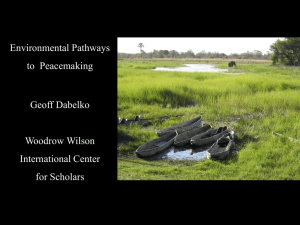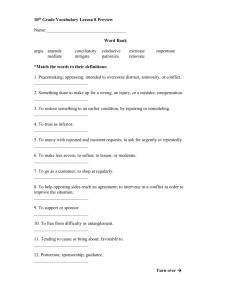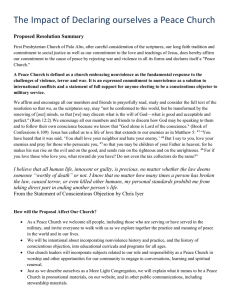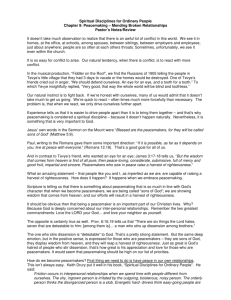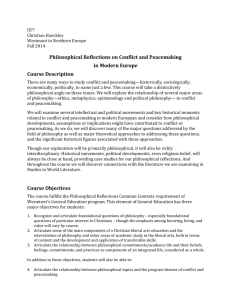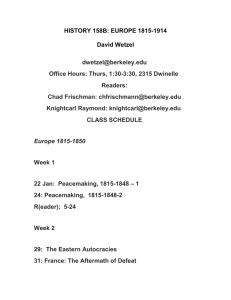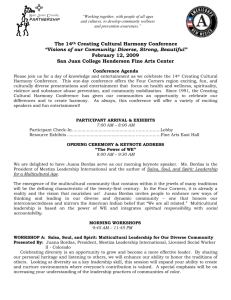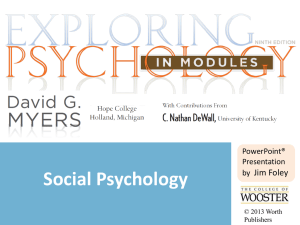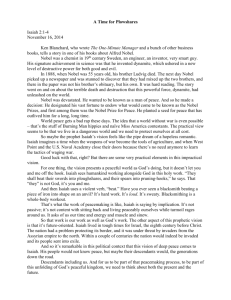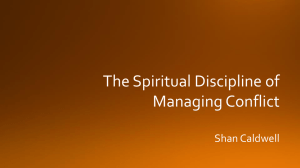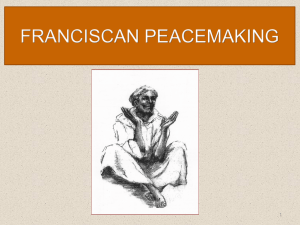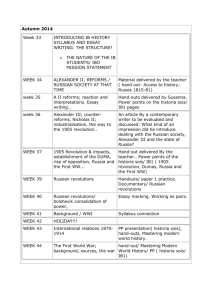Peacemakers Book Discussion Program
advertisement
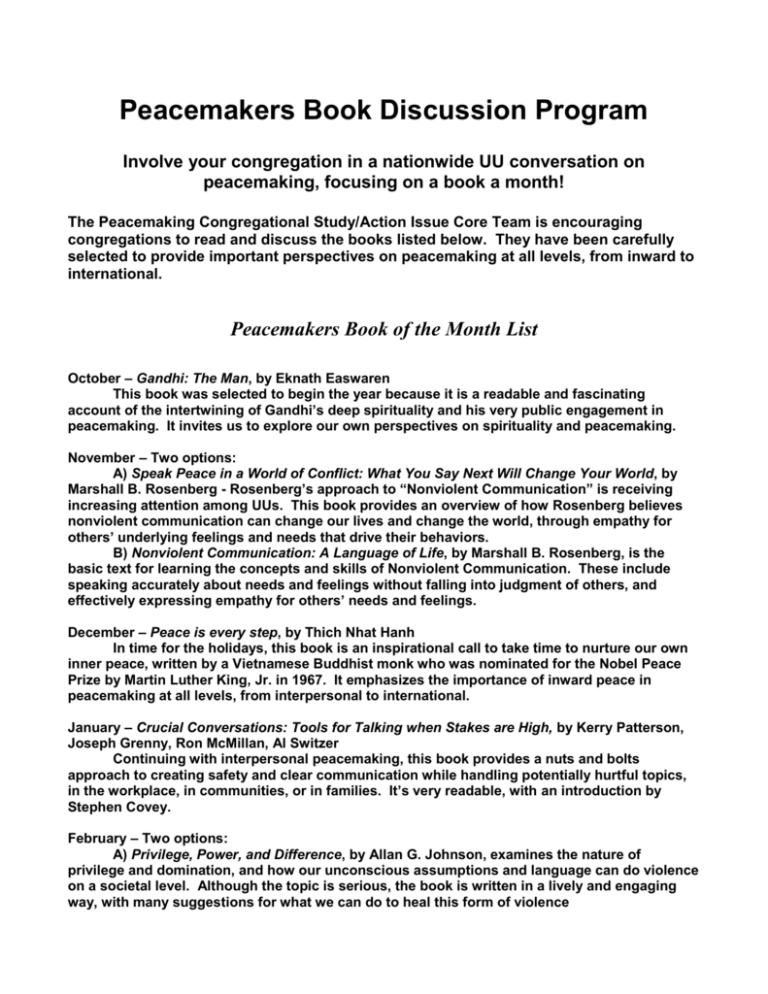
Peacemakers Book Discussion Program Involve your congregation in a nationwide UU conversation on peacemaking, focusing on a book a month! The Peacemaking Congregational Study/Action Issue Core Team is encouraging congregations to read and discuss the books listed below. They have been carefully selected to provide important perspectives on peacemaking at all levels, from inward to international. Peacemakers Book of the Month List October – Gandhi: The Man, by Eknath Easwaren This book was selected to begin the year because it is a readable and fascinating account of the intertwining of Gandhi’s deep spirituality and his very public engagement in peacemaking. It invites us to explore our own perspectives on spirituality and peacemaking. November – Two options: A) Speak Peace in a World of Conflict: What You Say Next Will Change Your World, by Marshall B. Rosenberg - Rosenberg’s approach to “Nonviolent Communication” is receiving increasing attention among UUs. This book provides an overview of how Rosenberg believes nonviolent communication can change our lives and change the world, through empathy for others’ underlying feelings and needs that drive their behaviors. B) Nonviolent Communication: A Language of Life, by Marshall B. Rosenberg, is the basic text for learning the concepts and skills of Nonviolent Communication. These include speaking accurately about needs and feelings without falling into judgment of others, and effectively expressing empathy for others’ needs and feelings. December – Peace is every step, by Thich Nhat Hanh In time for the holidays, this book is an inspirational call to take time to nurture our own inner peace, written by a Vietnamese Buddhist monk who was nominated for the Nobel Peace Prize by Martin Luther King, Jr. in 1967. It emphasizes the importance of inward peace in peacemaking at all levels, from interpersonal to international. January – Crucial Conversations: Tools for Talking when Stakes are High, by Kerry Patterson, Joseph Grenny, Ron McMillan, Al Switzer Continuing with interpersonal peacemaking, this book provides a nuts and bolts approach to creating safety and clear communication while handling potentially hurtful topics, in the workplace, in communities, or in families. It’s very readable, with an introduction by Stephen Covey. February – Two options: A) Privilege, Power, and Difference, by Allan G. Johnson, examines the nature of privilege and domination, and how our unconscious assumptions and language can do violence on a societal level. Although the topic is serious, the book is written in a lively and engaging way, with many suggestions for what we can do to heal this form of violence B) The Truth About Stories: A Native Narrative, by Thomas King, explores how stories shape our consciousness, and how our stories about those who are different from us can lead to violent or peaceful interactions. The author is native American and although the book focuses on native American experience, the insights extend to all types of systemic violence. March - The Great Turning, by David Korten This book has been a focus of discussion in many UU groups, as an overview of what has led to the societal and environmental violence underlying many of our social problems, and what needs to be done to move toward a peaceful, just, sustainable global community. April. – Two options: A) The Third Side: Why We Fight and How We Can Stop, by William Ury summarizes Ury’s research on conflict resolution around the world, as co-founder of the Program on Negotiation at Harvard Law School. It presents roles that peacemakers can play in contexts ranging from family squabbles to international disputes. It’s a lively, hopeful, and down-to-earth discussion of how violent conflict can be prevented at all levels. B) People Building Peace II: Successful Stories of Civil Society (Project of the European Centre for Conflict Prevention), by Paul Van Tongeren, Malin Brenk, Marte Hellema, and Juliette Verhoeven – This is a wide-ranging book with many stories of successful peacebuilding around the world, so readers may want to focus on selected stories that they find most interesting. May – Two options: A) Real Peace, Real Security by Sharon Welch, scheduled to be released April 2008 Sharon Welch is a UU who has been an active leader in the UU Peacemaking CSAI program. She is provost of ML Theological Seminary and an expert in international relations. The book provides an overview of current approaches to preventing war and sectarian or ethnic violence, with a forward by William Schulz. B) Soft Power: The Means to Success In World Politics, by Joseph Nye, Jr., - Nye, a UU, is a former Assistant Secretary of Defense and Dean of Harvard University's John F. Kennedy School of Government. In this book he explores how the power of persuasion and attraction can be more effective in resolving or preventing international conflicts than military force. Background Information: The Peacemaking Congregational Study/Action Issue Core Team is inviting congregations to hold a series of book discussions as one effective way to engage congregations in peacemaking education. The list of books has been carefully selected to provide important and varied perspectives on peacemaking at all levels, from inward to international. The book discussions could be organized in a variety of ways. If a book a month seems too fast a pace, congregations might opt to focus on two or three books for the year. One congregation is intending to follow the ‘book of the month’ format, but will make it open to those who have not read the book by arranging to have several volunteers first share for 10 minutes each what they found most meaningful in reading the book, and then opening it up for general discussion. In terms of formats, one congregation prepared a set of discussion questions and then went around the group with each question allowing each person to respond without interruption. Other groups may choose to have a more informal discussion format. Books can be obtained from online book sellers such as Amazon.com (their used books are quite inexpensive), and most are also available in local bookstores. If congregations would like to consider other books, a more comprehensive list is available in the Peacemaking Resource Guide, accessible at www.uua.org/csai (click on Peacemaking Home Page). The Core Team would welcome feedback on the books and the program! Please send your comments to Judy Morgan, judymorgan711@yahoo.com or John Hooper, jhooper@optonline.net.
